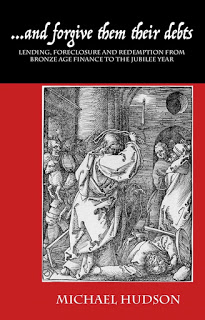Summary:
A Review of Michael Hudson’s new book AND FORGIVE THEM THEIR DEBTS The money lenders don't just want to earn interest on their loans, but they want to get all the collateral too, says Michael Hudson. Their aim is to own everything. They have already bought up most of the world by forcing privatisation on third world countries. To say that Michael Hudson’s new book And Forgive Them Their Debts: Lending, Foreclosure, and Redemption from Bronze Age Finance to the Jubilee Year (ISLET 2018) is profound is an understatement on the order of saying that the Mariana Trench is deep. To grasp his central argument is so alien to our modern way of thinking about civilization and barbarism that Hudson quite matter-of-factly agreed with me that the book is, to the extent that it will be
Topics:
Mike Norman considers the following as important:
This could be interesting, too:
A Review of Michael Hudson’s new book AND FORGIVE THEM THEIR DEBTS The money lenders don't just want to earn interest on their loans, but they want to get all the collateral too, says Michael Hudson. Their aim is to own everything. They have already bought up most of the world by forcing privatisation on third world countries. To say that Michael Hudson’s new book And Forgive Them Their Debts: Lending, Foreclosure, and Redemption from Bronze Age Finance to the Jubilee Year (ISLET 2018) is profound is an understatement on the order of saying that the Mariana Trench is deep. To grasp his central argument is so alien to our modern way of thinking about civilization and barbarism that Hudson quite matter-of-factly agreed with me that the book is, to the extent that it will be
Topics:
Mike Norman considers the following as important:
This could be interesting, too:
Robert Vienneau writes Austrian Capital Theory And Triple-Switching In The Corn-Tractor Model
Mike Norman writes The Accursed Tariffs — NeilW
Mike Norman writes IRS has agreed to share migrants’ tax information with ICE
Mike Norman writes Trump’s “Liberation Day”: Another PR Gag, or Global Reorientation Turning Point? — Simplicius
A Review of Michael Hudson’s new book AND FORGIVE THEM THEIR DEBTS
The money lenders don't just want to earn interest on their loans, but they want to get all the collateral too, says Michael Hudson. Their aim is to own everything. They have already bought up most of the world by forcing privatisation on third world countries.
To say that Michael Hudson’s new book And Forgive Them Their Debts: Lending, Foreclosure, and Redemption from Bronze Age Finance to the Jubilee Year (ISLET 2018) is profound is an understatement on the order of saying that the Mariana Trench is deep. To grasp his central argument is so alien to our modern way of thinking about civilization and barbarism that Hudson quite matter-of-factly agreed with me that the book is, to the extent that it will be understood, “earth-shattering” in both intent and effect. Over the past three decades, gleaned (under the auspices of Harvard’s Peabody Museum) and then synthesized the scholarship of American and British and French and German and Soviet assyriologists (spelled with a lower-case ato denote collectively all who study the various civilizations of ancient Mesopotamia, which include Sumer, the Akkadian Empire, Ebla, Babylonia, et al., as well as Assyria with a capital A). Hudson demonstrates that we, twenty-first century globalists, have been morally blinded by a dark legacy of some twenty-eight centuries of decontextualized history. This has left us, for all practical purposes, utterly ignorant of the corrective civilizational model that is needed to save ourselves from tottering into bleak neo-feudal barbarism.
This corrective model actually existed and flourished in the economic functioning of Mesopotamian societies during the third and second millennia B.C. It can be termed Clean Slate amnesty, a term Hudson uses to embrace the essential function of what was called amargi and níg-si-sá in Sumerian, andurārum and mīšarum in Akkadian (the language of Babylonia), šudūtu and kirenzi in Hurrian, para tarnumar in Hittite, and deror (דְּרוֹר) in Hebrew: It is the necessary and periodic erasure of the debts of small farmers — necessary because such farmers are, in any society in which interest on loans is calculated, inevitably subject to being impoverished, then stripped of their property, and finally reduced to servitude (including the sexual servitude of daughters and wives) by their creditors, creditors. The latter inevitably seek to effect the terminal polarization of society into an oligarchy of predatory creditors cannibalizing a sinking underclass mired in irreversible debt peonage. Hudson writes: “That is what creditors really wanted: Not merely the interest as such, but the collateral — whatever economic assets debtors possessed, from their labor to their property, ending up with their lives” (p. 50).
And such polarization is, by Hudson’s definition, barbarism. For what is the most basic condition of civilization, Hudson asks, other than societal organization that effects lasting “balance” by keeping “everybody above the break-even level”?
Unz Review

